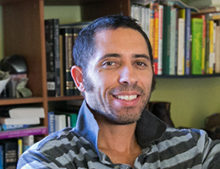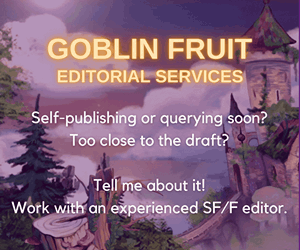From the outset, Fiona is at odds with the people around her, with the expectations of her culture, and with what she sees as her future. Ironically, she doesn’t really start fitting in until she becomes something of an anomaly. Is this simply compelling fiction? Or is this also drawing on your own experiences?
Growing up, I felt at odds with society because of my sexual orientation, and though I was never ashamed of my queerness, I was certainly aware of the fact that it was frowned upon by certain members of my family. In order to be myself, I had to step back, live my own life, which meant pursuing writing instead of getting a “real job” like they expected. I think this otherness is a large part of what fuels my fiction, which is largely uninterested in the lives of the status quo. Fiona is like me, in the sense that she chafes against society’s expectations. Some of her experiences are my own: attending graduate school, critiquing student films (as an undergraduate, I studied both film and literature), and falling in love with the wrong person, someone I mistakenly believed to be “the one.” That experience fueled the story.
In terms of the writing process, where did this story start for you and how did it develop?
This was a concept-driven story. I wanted very much to write about my experience of mistakenly believing I had found “the one,” but I also knew that the essential plot of that story wasn’t new or even that interesting in and of itself. I needed to find a way to maintain the core of the love story while allowing myself to explore the themes of doubt and self-deception in a more nuanced way. Once I hit upon the idea of the timer, the story progressed from there, and, though I had no idea, when I began, where each scene would lead me, I was able to write the first draft straight through just by following the logical turns in the narrative. Once I introduced the infallible timer, I knew I had to undermine it. As soon as Fiona started to accept her completion date, I changed it. When Fiona met Marian, I withheld the happy ending. These were all decisions I made in the course of writing. Nothing was planned, and yet the story as it appears now is not much different from that first draft. One scene, the last, is a bit longer, but that’s all.
This piece takes the idea of finding “the one” to the next level, making it even more of a given (to a point), but then plays with notions around what “the one” actually is, subverting mainstream prescriptive concepts. Why, do you think, are we as enraptured as we are with the notion of a standard storybook/movie romance?
Storybook romances like those seen in Hollywood are popular for a reason: They offer a sense of certainty and security that doesn’t exist in the real world. Lovers in these stories are “destined” to be together, are “perfect” for each other, feel “completed” by their “true love.” These phrases all carry with them a sense of finality, of having reached the conclusion of the story: You have found your love, and now you’ll never have to worry again. But the reality is that you do have to worry. Relationships are messy. Divorce rates are high. A friend of mine recently told me that her ex is much better at emotional support than her husband, which is not to say that she doesn’t love her husband, just that he isn’t perfect and that sometimes she’s disappointed by that fact. Hollywood romances have given us unreasonable expectations of what a significant other should be: At once your best friend, perfect lover, and emotional rock, “the one” is supposed to be your everything. It’s a comforting idea, certainly, and I can understand why people yearn for it, but few among us can say with 100% certainty that they’re with the right person. Nor should they have to. I think if we put less pressure on ourselves to find “the one” early, we would be much more satisfied in our relationships overall.
Especially powerful, I think, is the idea that soulmates may not be pleasant at first, and that the situation can be kind of bad for a long time, but that people reshape themselves or put up with those situations because of a promise of some kind of fulfillment. Is it human instinct, a drive for community and companionship? Or are we culturally conditioned to change or control parts of ourselves in order to be part of something else?
I think the willingness to change yourself in order to become part of something else—whether it be a high school clique, a football team, a marriage—is culturally conditioned, yes, although the desire to be part of something feels more innate. We should separate the fact of a desire from the lengths someone is willing to go to in order to achieve it, because those lengths vary significantly based on various factors, particularly gender. Women are taught from an early age that they have to please their man, that in order to do that they have to look a certain way or be a certain weight or put up with all manner of misogynistic and abusive behaviors. The recent #MeToo movement has shed light on how toxic this conditioning has been for our society. I knew, when I invented the timer, that it wasn’t a panacea. It wasn’t going to fix the problem of toxic masculinity or rape culture. Instead, it just dangled a carrot at the end of it: Put up with this, and you’ll get your soul mate out of it. I’ve always found that element of the story very frightening.
I enjoyed the depictions of nontraditional relationships of various kinds, set out in nonjudgmental portrayals and normalized within the story. In the hands of another author, these representations might have looked very different, or not appeared at all. Is showing different sorts of relationships important? Also—is there a suggestion here that, in a world where an inevitable pairing could be anyone, cultures will naturally develop that are less prejudicial and more open-minded?
Most of my stories feature queer characters, and, from a political perspective, it has always been important to me to tell stories that straight white society might otherwise overlook. As a writer, I think it’s important to be able to write outside of yourself, to explore characters who are of a sex, gender, race, class, martial status, education level, or body type other than your own. This is just good practice. We can’t practice our craft honestly if we never consider any opinion or life other than our own. When we don’t, the narratives become limited, the characters repetitive. We don’t grow, and that’s death for a writer.
Though I would like to believe that a world where “the one” could be anyone (regardless of race, gender, or religion) would be more open-minded, I think the reality is that prejudice would still exist, though in a somewhat different form. People will naturally develop their own preferences. And expectations. To say nothing of scientifically inaccurate beliefs of the statistical likelihood of X, Y, or Z pairing. For example, a cishet man who earnestly believes his soul mate will be a woman will undoubtedly react poorly when it turns out his soulmate is a gay man. Homophobia and racism are still possible in the world of “Nitrate Nocturnes,” but I did not go out of my way to make room for them.
The ending was surprising but effective. Did you try out different endings or was this where you always wanted the story to go?
I always knew I wanted to end the story in that setting, with Fiona sitting in the darkened theater, but I didn’t know going in that Marian would be sitting next to her. I debated that for a long time (whether to bring them back together or keep them apart). For a while, I considered having Fiona sit off to one side and watch jealously as Marian and her boyfriend enjoyed themselves, but there could be no real resolution in that version; it would only have driven Fiona crazy and needlessly twisted the knife in her heart. Eventually, I realized that I could have it both ways: bring the two back together and keep them apart by not resolving the issue of Marian’s timer. The implication is that Marian timer’s has X amount of time left and Fiona will stay with Marian in the hope that, when Marian reaches her completion date, she’ll be on the other end of it.
Is there anything else you want readers to know about you or this piece?
This story was inspired in no small part by my time at Cornell Cinema. In college, I worked there evenings and weekends, and I attended parties much like the one in the final scene of this story—including one where I saw a strip of nitrate film burned before my very eyes. It’s rare, in the age of DVDs and digital media, to experience film in this way: to feed the projector, to watch for the circle that tells you to change the reel, to see a film decay. For all the glories of high-def, there’s something being lost in the transition from celluloid to digital. I suppose what I’m saying is this: Support your local art house theatres. You might just find the love of your life there.
You’ve been publishing for a while now and your collection Night Beast is coming out in May. You have made a study and practice of fiction, through both academics and workshops. How has your writing changed in the last few years? Are there aspects or elements of writing that are more of a struggle for you?
All through undergrad and up until my second semester in grad school, I wrote pretty exclusively literary fiction and poetry. That all changed when I took Kevin Brockmeier’s workshop at the Iowa Writers’ Workshop. This was a workshop devoted entirely to science fiction and fantasy, and the experience changed the way I thought about my craft. I had of course grown up on Harry Potter, The Lord of the Rings, and Ender’s Game, so I was no stranger to genre fiction—I had just never written it before. I suppose a part of me thought I wasn’t capable of it. And then, over the course of the semester, I wrote this strange, magical novelette about Buddhist monks living in a fishing village, where they make a substance known as “wax” that has extraordinary healing properties. It was so far removed from anything else that I had written that I was kind of astounded and had no idea if I could do it again. I waited a long time for my next science fiction idea to come to me. For me, the hardest part of writing is waiting for an idea to arrive fully formed. Often, I get impatient and start writing something before I’m emotionally or intellectually prepared for it. That’s always a mistake.
What are you working on now that we can look forward to?
Right now, I’m working on a novel called Blood and Sweat. It’s set in a world that is suffering from an outbreak of a deadly new single-strand RNA lentivirus. My main characters, a gay man and a transwoman, are trapped inside a massive quarantine in New York City, where they must struggle to survive as society deteriorates around them. My goal is to finish the novel and sell it this year. Fingers crossed!
Enjoyed this article? Consider supporting us via one of the following methods:









